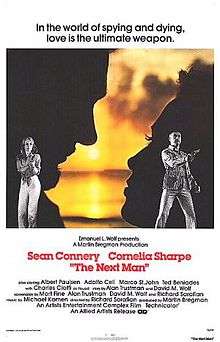The Next Man
| The Next Man | |
|---|---|
 Original poster | |
| Directed by | Richard C. Sarafian |
| Produced by | Martin Bregman |
| Written by |
David M. Wolf Morton S. Fine Richard C. Sarafian Alan Trustman |
| Starring |
Sean Connery Adolfo Celi Cornelia Sharpe |
| Music by | Michael Kamen |
| Cinematography | Michael Chapman |
| Edited by |
Aram Avakian Robert Q. Lovett |
| Distributed by | Allied Artists Pictures Corporation |
Release dates |
|
Running time | 108 min. |
| Country | United States |
| Language | English |
The Next Man (also known as The Arab Conspiracy or Double Hit) is a 1976 American political action thriller film starring Sean Connery, Adolfo Celi, Cornelia Sharpe and Charles Cioffi. Critical reaction at its opening was not positive. Music for the film features New York City guitarist Frederic Hand.
Plot
The film is set during the Arab oil embargo of 1976. Khalil Abdul-Muhsen (Connery) is the Saudi Arabian minister of state who proposes to recognize Israel, support Israeli membership in OPEC and sell Saudi oil to needy nations. His plan is to protect third-world nations from the threat of Cold War ideology. Khalil's radical agenda and idealism finds few friends and he is soon the target of multiple assassination attempts by Arab terrorist groups.
They send Nicole Scott (Sharpe) to infiltrate Abdul-Muhsen's entourage, seduce him and await further instructions. However, she develops strong feelings for him in reality and the completion of the plan is jeopardized.
Cast
- Sean Connery as Khalil Abdul-Muhsen
- Cornelia Sharpe as Nicole Scott
- Albert Paulsen as Hamid
- Adolfo Celi as Al Sharif
- Marco St. John as Justin
- Ted Beniades as Frank Dedario
- Charles Cioffi as Fouad
- Jaime Sánchez as New York security[1]
Reception
The film on its release was not received particularly well by critics. Roger Ebert on November 17, 1976 criticized the plot, remarking, "When good directors work with bad material, Pauline Kael once said, what happens is that they shove art into the crevices of dreck. That would do as a description of 'The Next Man,' a movie with an impenetrable plot."[2]
Ebert commented that the film had some scenes that worked, particularly those between Sean Connery, as the minister of state for Saudi Arabia, and Cornelia Sharpe, who plays a professional international assassin, although the plot lacked details to understand these characters more fully. Ebert was impressed by Sharpe's performance as Nicole Scott, describing her as a "cool beauty."[2]
Vincent Canby of The New York Times described the film as a "suspense melodrama made by people whose talent for filmmaking and knowledge of international affairs would both fit comfortably into the left nostril of a small bee."[3] Like Ebert, he identified flaws in the plot, remarking that "The Next Man is obsessed with political assassination but it never really identifies its villains, preferring, instead, to cop out by playing on natural paranoia that assumes that everyone everywhere is on the take from someone somewhere. This attitude is too easy to represent true cynicism."[3] Canby also criticized locations in the film that added to the confusing nature of the plot, commenting "The Next Man moves rootlessly around the world like a fretful tourist, from New York City to the Middle East, the south of France, London, Ireland, Bavaria, and the Bahamas, though nothing much happens in any one of these places that couldn't as easily happen somewhere else."[3]
Variety was not impressed, commenting, "The Next Man emerges more a slick travesty with political overtones than the cynical suspense meller it was designed to be."[4]
Producer Martin Bregman received an official protest from the Saudi government after the film was released.
References
- ↑ Jaime Sanchez (actor credit)
- 1 2 Chicago Sun-Times review by Roger Ebert , November 17, 1976, Retrieved on July 7, 2008
- 1 2 3 Canby, Vincent (November 11, 1976). "Next Man Plays on Paranoia". New York Times. Retrieved 2008-07-07.
- ↑ Variety Review of The Next Man, 1976, Retrieved on July 7, 2008</